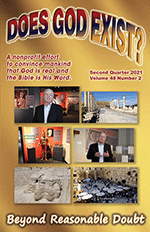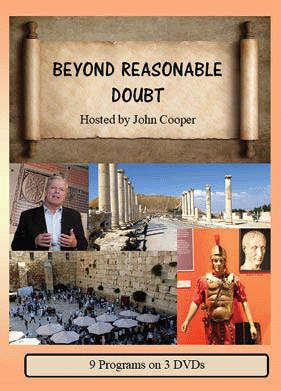Return to 2nd Quarter 2021 articles.


Editor’s Note by John N. Clayton: Attacks on Christianity continue to increase globally. For over 50 years, the Does God Exist? ministry has been dedicated to showing the compatibility of science and the Christian faith. Atheists and skeptics frequently attack the historical accuracy of the Bible. Most of us, including myself, lack the knowledge of archaeology we need to defend against those attacks. We have a solution.
Many years ago, we met John Cooper, who has done research in archaeology and biblical history and has an advanced degree in Christian apologetics and philosophy of religion. He has spent many years traveling and studying in the Holy Land. For about five years, we worked with John to organize his teaching into a form that we could share with others. We have now produced a new video series dealing with biblical archaeology, the inspiration and accuracy of the Bible, and the historicity and divinity of Jesus Christ. The following is John Cooper’s introduction to this study.
Thank you for your interest in the most important of human endeavors — finding faith in God. It is with much excitement and hope that we announce a new video series entitled Beyond Reasonable Doubt. John Clayton asked me to put together this series on evidence for the reliability and inspiration of the Bible. As a natural and essential extension of that, I included the ultimate reason for Scripture — the revelation of salvation through Jesus of Nazareth as predicted and fulfilled in the pages of the Bible. Paul said to Timothy, “… from infancy, you have known the holy Scriptures, which are able to make you wise for salvation through faith in Christ Jesus” (2 Timothy 3:15 NIV 1984).
The apostle Peter wrote, “But in your hearts set apart Christ as Lord. Always be prepared to give an answer to everyone who asks you to give the reason for the hope that you have. But do this with gentleness and respect” (1 Peter 3:15). The phrase “give an answer” is from the Greek word apologia, from which we get the term Christian “apologetics.” Some versions translate this phrase as “give a defense.” And so this video series Beyond Reasonable Doubt is an attempt to “give a defense” with “gentleness and respect” for the Christian faith to all who may ask us why we believe. Be it known that I had to leave out many things due to time, space, and audience attention span. We hope that this series will be a beginning point and catalyst for deeper digging into the field of archaeology and the Bible.

There seems to be some confusion about the very definition of biblical faith. If you were to look in a dictionary, you would find that it defines faith as belief without reasons or evidence. However, in Scripture, faith is based on solid facts, reasons, and evidence. We find a biblical definition of faith in Hebrews 11:1, “Now faith is the substance of things hoped for, the evidence of things not seen” (KJV). Faith is based on reality and evidences of reality. On Pentecost, Peter proclaimed to the people, “Men of Israel, listen to this: Jesus of Nazareth was a man accredited by God to you by miracles, wonders, and signs, which God did among you through him, as you yourselves know … God has raised this Jesus to life, and we are all witnesses of the fact” (Acts 2:22, 32). In Athens, Paul spoke about a day of judgment and said God “has given proof of this to all men by raising him from the dead” (Acts 17:31). So in the New Testament, faith is founded on evidence, facts, and proof.
Biblical archaeology is one way of gaining evidence of and information about people, places, and events mentioned in the Bible. Thus, it can increase our faith by acquainting us with evidence from the past that supports the historicity, authenticity, and reliability of the Bible. The information gleaned from these archaeological digs can also help us “give an answer to everyone” who asks the reason for the hope that we have.
We want to define the purpose for this series more clearly. This study is not just to find facts but also to find the meaning and relevance of those facts. I believe that every human being has at least four needs to make their lives fulfilling and meaningful. A scripture familiar to many is John 3:16, and it contains these four necessities:
For God so loved the world,
(1. We all need love.)
that he gave his only begotten Son,
(2. We all need to be valued.)
that whosoever believes in him should not perish,
(3. We all need forgiveness.)
but have everlasting life.
(4. We all need hope.)
Therefore, our goal in this series is to help all who will look at the evidence openly and honestly to know “beyond reasonable doubt” that the Bible is reliable and trustworthy. We want people to find faith in God through his word and from that faith in Jesus of Nazareth to find love, value, forgiveness, and hope.
Video Series Outline

- Introduction to Biblical Archaeology and Faith — What are biblical archaeology and biblical faith, and why are they important to us today?
- The Textual Reliability of the Bible — Is our Bible reliable, or is it full of errors and inaccuracies? How can we know if we can trust it?
- Archaeology and the Old Testament (Part 1) — This segment looks at archaeological discoveries relating to the Old Testament up to the time of the United Monarchy –approx. 1,000 B.C.
- Archaeology and the Old Testament (Part 2) — This session deals with archaeological findings relating to the Bible from around 1,000 B.C. to about 400 B.C.
- Archaeology and the New Testament (Part 1) — This presentation examines archaeological finds from the time of the life and ministry of Jesus in the land of Israel.
- Archaeology and the New Testament (Part 2) — This session shares archaeological discoveries from the time of Paul’s missionary journeys.
- The Inspiration of the Bible — This gives reasons for believing that the Bible is not just a human production but that God guided the writers. Therefore it is a book like no other that can give us hope, forgiveness, purpose, and eternal life.
- The Historicity of Jesus — Did Jesus really live, or was he an invention of men? We examine sources that conclusively prove that Jesus was a real person of history.
- The Divinity of Jesus Examined — The New Testament pictures Jesus as the Divine Son of God and Savior of mankind. This presentation examines these claims honestly and thoroughly.
Picture credits:
Cover pictures by John Cooper and Roland Earnst
© Andrey_Kuzmin. Image from Big Stock.com
© jgroup. Image from Big Stock.com
© Andrey_Kuzmin. Image from Big Stock.com; other pictures by John Cooper and Roland Earnst
Scripture links/references are from BibleGateway.com. Unhighlighted scriptures can be looked up at their website.
